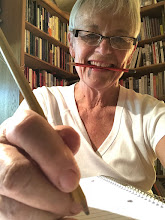I suppose the argument can be made that these lovely shots along with a number of driving-down-the-road-scenes serve to note the passing of time in the Mark Moskowitz's quest. Muskowitz, the filmaker, is trying to locate the author of a book written in 1972 which he read 25 years after it had been published and fell in love with. He wants to read more books by the guy. However, Dow Mossman, author of this book Stones for Summer, has only written one book, and Muskowitz is determined to find out why. As you can see, this is a fairly weak notion upon which to build a 2hr and 8min film.
However, I think that the most serious flaws in this film have to do with the fact that filmaker is coming from a totally masculine perspective:
- Muskowitz has an abruptness that boarders on rudeness as he interviews people he is hoping will help him with his search. I suppose it is difficult for documentarians to capture a crisp interview, especially when many of the interviewees are older men who ramble and don't speak clearly. But I'm certain a woman could have done it with considerably more finesse the Muskowitz managed.
- There are many shots of shelves in Muskowitz's library as well as shelves in public and school libraries and piles of books on tables and in boxes. Almost all of the books are by men. The only women writers who appear are Harper Lee, Sylvia Plath, and Virginia Woolf. Doesn't this guy read anything of note by women? What about Joan Didion, Annie Dillard, Willa Cather, Louise Erdrich, Nadine Gordimer, or Margaret Atwood to name a few. How can Muskowitz call himself a consummate reader when these notable writers don't live on his shelves or appear in his film? (I might add that I have read many of the male writers I saw in his library: Hemingway, Fitzgerald, Joseph Heller, John Updike, Melville, Kundera, and Chiam Potok.)
- Muskowitz visits the Iowa Writer's workshop and talks with Frank Conroy among other male teachers, all of whom discuss the hard-nosed, heavily critical approach to developing writers that was in vogue back when this writer Dow Mossman was in the program. We also hear from one of Mossman's teachers who says it was he who "guided" the young writer through the writing of his first (and only) novel. The man admits that the writing of the book "broke" Mossman.
- Shortly after the book was finished Mossman was hospitalized with a mental breakdown and spent the next 19 years working as a welder. When Muskowitz finds Mossman, he says that it took him 9 years to recover from the stress of writing the book. According to the men interviewed in this film, many writers have only one book in them. HMMMM . . . I wonder if the "guidance" they receive as budding writers has anything to do with this?
This movie did little to support the wildly wonderful experience I know as a writer and reader. I know the publishing industry is brutal and competitive (I have my pile of rejections letters), but I've been been touched gently and sublimely by women writers, teachers, and editors who have shown me there is a larger, more generous and more inspiring side to being a writer and reader than Muskowitz offered in this film.
Sadly, most of the professional reviewers (primarily men) gave this film two thumbs up.
ph





No comments:
Post a Comment